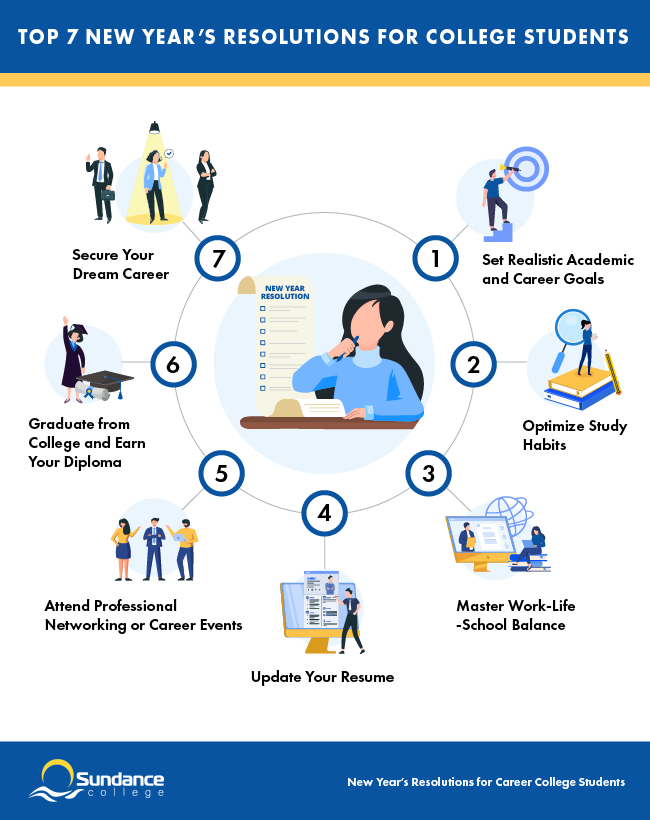Blog / Top 15 New Year’s Resolutions for Career College Students
Sundance Blog
Top 15 New Year’s Resolutions for Career College Students

Explore our Diploma Programs
- Business, Hospitality, and Legal
- Health and Human Services
- Technology
Table of Contents
The new year is a great time to set goals that can help you do better in college and grow in your career. Set academic new year resolutions like keeping your workspace organized, improving your study habits, setting realistic goals, and balancing school with other parts of your life.
Work on your career by updating your resume, improving your LinkedIn profile, meeting new people, and learning about the latest trends in your field. These steps can help you stay on track for your desired career while taking care of yourself.
Listen to “Top 15 New Year’s Resolutions for Career College Students”
Tips for Making New Year’s Resolutions
Making good New Year’s resolutions is about setting goals for students that you can stick to and that really help you. Here are some simple tips to make your resolutions work:
- Be Specific: Instead of saying, “I want to study more,” set a goal like, “I will study 40 extra minutes every week.” Being clear makes it easier to know what you need to do. This approach supports developing good study habits and achieving academic goals.
- Stay Realistic: Pick goals that fit into your schedule and abilities. For example, instead of deciding to work out every single day, start with two or three days a week. This way, you won’t feel overwhelmed and are more likely to succeed.
- Break It Down: Big goals can feel scary, so split them into smaller steps. If you want to improve your communication skills, start by setting a target for each class, like answering one question from your instructor. Small steps lead to big results, one of the key academic improvement strategies.
- Measure Progress: Keep track of how you’re doing. For example, if you’re trying to save money, write down how much you save each week while learning other budgeting tips for students. Celebrating small wins can keep you motivated.
- Stay Flexible: Life happens, so it’s okay to adjust your goals. If you plan to attend a networking event but had a big test that week, reschedule it for another time. Being flexible helps with overcoming challenges in college and staying on track without feeling guilty.
- Prioritize: Focus on what matters most to you. If your main goal is to land a full-time job, spend more time building your resume and practicing for interviews than on less urgent tasks.
These tips can help you create resolutions that are easier to stick to and more rewarding.
Top 15 New Year’s Resolutions for College Students

Here are 15 practical and impactful resolutions to help you make the most of your career college experience and prepare for a successful career. Let’s start with something simple but powerful — staying organized in college by decluttering your space.
1. Declutter Your Physical and Digital Workspace
Start the year with a fresh slate by tidying your desk — throw away old papers, sort supplies, and keep only essentials within reach. For your digital space, delete unnecessary files, organize documents into folders, and clear out your email inbox. A clean workspace helps you stay focused and reduces stress and is one of the top productivity tips for students.
2. Set Realistic Academic and Career Goals
Set achievable academic and career goals, like improving grades in key subjects and securing an entry-level position in your field within six months of graduation. Your career planning during college should include identifying job roles with manageable entry requirements and gaining the necessary skills and experience through your practicum placement.
3. Improve Classroom Participation
Engage in class to boost your social skills development. Ask questions to clarify points, share examples to connect material to real-world applications, and participate in discussions. This not only improves learning but also helps with building better relationships with instructors and peers, which could lead to mentorship or recommendation opportunities.
4. Optimize Study Habits
To improve your study habits, try proven techniques like the Pomodoro method —working in focused intervals with short breaks — or active recall, which involves testing yourself on what you’ve learned.
Use tools like flashcards, apps, or planners to stay organized. Experiment with different environments, such as quiet libraries or group study sessions, to see what works best for your focus and retention. This supports study habits improvement and effective learning.
5. Prioritize Physical Health
Your physical health directly impacts your energy and focus.
In 2025, commit to at least 30 minutes of exercise a few times a week, whether it’s walking, yoga, or hitting the gym. Focus on healthy eating for students by planning meals that include fruits, vegetables, and proteins to fuel your brain, and avoid skipping meals during busy days. Aim for 7–9 hours of sleep each night to stay alert and reduce stress.
Following a healthy lifestyle for college students helps you tackle academic and professional challenges with more energy and confidence.
6. Read Career-Related or Motivational Books
Books can offer valuable insights and skills to help you grow.
For example, books like Atomic Habits by James Clear help develop positive habits for students, while JumpStart Your Priorities A 90-Day Improvement Plan by John C. Maxwell offers career and personal growth strategies. This supports a lifelong learning mindset.
Look for books specific to your field, such as technology trends or leadership principles, to align your reading with your career goals.
7. Master Work-Life-School Balance

Balancing school, work, and personal life takes planning. In 2025, create a daily or weekly schedule that includes blocks for studying, attending classes, work shifts, and personal time. Use tools like Google Calendar or planner apps for effective time management.
Learn to say no to tasks that don’t align with your priorities and set aside time for hobbies or relaxation to recharge and avoid burnout. A balanced schedule fosters college life balance as one of the most effective stress management techniques.
8. Practice Self-Care
Taking care of your mental and emotional health is just as important as academic success. Practice mindfulness through meditation apps, breathing exercises, or yoga. Dedicate time to hobbies you enjoy, whether it’s painting, gaming, or spending time with friends.
To set yourself up for college success, don’t hesitate to seek support from college career services or friends if you’re feeling overwhelmed. Regular self-care for college students supports your mental health in college, which is essential for keeping you refreshed and overcoming procrastination in the upcoming new year.
9. Update Your Resume
The New Year is a perfect time to revise your resume to reflect your latest achievements, skills, and experiences. Add new coursework, practicums, certifications you’ve accomplished during your college studies, or volunteer work relevant to your field. Tailor your resume for specific job roles by highlighting skills that match the position. Use action verbs like “managed,” “created,” or “improved” to make your accomplishments stand out.
10. Optimize Your LinkedIn Profile
A strong LinkedIn profile helps with networking for college students, increasing your visibility to potential employers. Update your profile picture to look professional, rewrite your summary to reflect your career aspirations, and list skills relevant to your field. Share posts about your achievements, career insights, or industry updates. Engage with others by commenting on posts or joining groups to stay active in your professional community in 2025.
11. Follow Industry Blogs and News
Keep up with the latest trends and innovations in your field by following blogs, subscribing to newsletters, or listening to podcasts.
Start by identifying platforms relevant to your career: search online for “top blogs/podcasts in [your industry]” or ask mentors and peers for recommendations. Bookmark a few reliable sources and dedicate 10–15 minutes daily to staying updated. This habit keeps you updated and shows potential employers you’re serious about your career.
12. Join a Professional Organization
Professional organizations offer opportunities for developing leadership skills, networking, and career growth. Look for groups like the Canadian Marketing Association for Digital Marketing and Social Media Management students or the Canadian Support Worker Association for Personal Support Worker students.
Membership often gives you access to exclusive resources, industry events, and mentorship opportunities. Being part of these groups adds credibility to your resume and helps you build valuable connections.
13. Attend Professional Networking or Career Events
Expanding your professional network is one of the keys to success in your future career and could be a good New Year’s resolution:
1) Make the most out of your college network. You have access to instructors, advisors, and classmates in college who share the same interest and industry. Do you know them all? Do they all know you? Make sure it’s two yeses here.
2) Plan to attend at least one networking event each quarter of 2025. This could include career fairs, industry meetups, or alumni events. Prepare by researching the attendees, dressing professionally, and having an elevator pitch ready. Follow up after meetings to maintain connections that could lead to mentorships or job opportunities.
14. Graduate from College and Earn Your Diploma
As a Sundance College student, graduating in 2025 is well within your reach thanks to our accelerated diploma programs. Make it a top New Year’s resolution to stay committed to completing your program with excellence. Picture yourself standing tall on graduation day, proudly holding your diploma and celebrating this life-changing achievement. Aim high — why not strive to be the valedictorian? Stay focused on your studies, use the resources available to you, and take each step with purpose.
15. Secure Your Dream Career

Make this the year you take bold steps toward turning your passion into a profession! Set a resolution to apply for at least one relevant position every week, focusing on roles that align with your career goals. Research companies you admire and learn about the skills they prioritize. Dedicate time to building those skills through your time in college.
Use the new year to commit to consistent effort, knowing each application and skill you develop brings you closer to your ideal career.
By incorporating these resolutions into your routine, you can build a solid foundation for personal growth, academic success, and career advancement.
At Sundance College, we are here to support you every step of the way in making your New Year’s resolutions a reality.
- All our students have lifetime access to career services, offering guidance with resumes, interview skills, and finding that important first job.
- We provide a 24/7 platform for mental health support, making sure you have the resources to maintain your well-being.
- Our flexible online learning format, focusing on one course at a time, supports you on your way to balancing studies and personal life, so you can study at your own pace from the comfort of home.
- Additionally, we offer curated resources to help you stay on track, including our insightful blog for tips and inspiration throughout the year.
With Sundance College by your side, you have the tools and support to make 2025 a year of growth and success!
